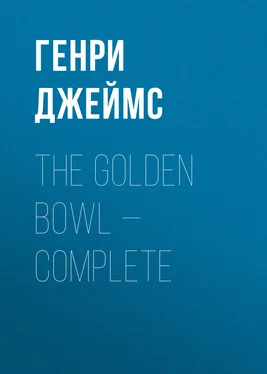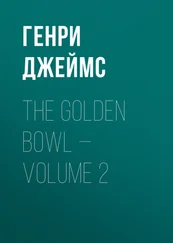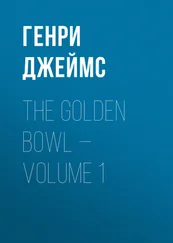Генри Джеймс - The Golden Bowl — Complete
Здесь есть возможность читать онлайн «Генри Джеймс - The Golden Bowl — Complete» — ознакомительный отрывок электронной книги совершенно бесплатно, а после прочтения отрывка купить полную версию. В некоторых случаях можно слушать аудио, скачать через торрент в формате fb2 и присутствует краткое содержание. Жанр: foreign_prose, foreign_antique, на английском языке. Описание произведения, (предисловие) а так же отзывы посетителей доступны на портале библиотеки ЛибКат.
- Название:The Golden Bowl — Complete
- Автор:
- Жанр:
- Год:неизвестен
- ISBN:нет данных
- Рейтинг книги:3 / 5. Голосов: 1
-
Избранное:Добавить в избранное
- Отзывы:
-
Ваша оценка:
- 60
- 1
- 2
- 3
- 4
- 5
The Golden Bowl — Complete: краткое содержание, описание и аннотация
Предлагаем к чтению аннотацию, описание, краткое содержание или предисловие (зависит от того, что написал сам автор книги «The Golden Bowl — Complete»). Если вы не нашли необходимую информацию о книге — напишите в комментариях, мы постараемся отыскать её.
The Golden Bowl — Complete — читать онлайн ознакомительный отрывок
Ниже представлен текст книги, разбитый по страницам. Система сохранения места последней прочитанной страницы, позволяет с удобством читать онлайн бесплатно книгу «The Golden Bowl — Complete», без необходимости каждый раз заново искать на чём Вы остановились. Поставьте закладку, и сможете в любой момент перейти на страницу, на которой закончили чтение.
Интервал:
Закладка:
The man, not ungraciously, resigned himself. “Well, I’ll keep it for you.”
The small quarter-of-an-hour had had its marked oddity—this she felt even by the time the open air and the Bloomsbury aspects had again, in their protest against the truth of her gathered impression, made her more or less their own. Yet the oddity might have been registered as small as compared to the other effect that, before they had gone much further, she had, with her companion, to take account of. This latter was simply the effect of their having, by some tacit logic, some queer inevitability, quite dropped the idea of a continued pursuit. They didn’t say so, but it was on the line of giving up Maggie’s present that they practically proceeded—the line of giving it up without more reference to it. The Prince’s first reference was in fact quite independently made. “I hope you satisfied yourself, before you had done, of what was the matter with that bowl.”
“No indeed, I satisfied myself of nothing. Of nothing at least but that the more I looked at it the more I liked it, and that if you weren’t so unaccommodating this would be just the occasion for your giving me the pleasure of accepting it.”
He looked graver for her, at this, than he had looked all the morning. “Do you propose it seriously—without wishing to play me a trick?”
She wondered. “What trick would it be?”
He looked at her harder. “You mean you really don’t know?”
“But know what?”
“Why, what’s the matter with it. You didn’t see, all the while?”
She only continued, however, to stare. “How could you see—out in the street?”
“I saw before I went out. It was because I saw that I did go out. I didn’t want to have another scene with you, before that rascal, and I judged you would presently guess for yourself.”
“Is he a rascal?” Charlotte asked. “His price is so moderate.” She waited but a moment. “Five pounds. Really so little.”
“Five pounds?”
He continued to look at her. “Five pounds.”
He might have been doubting her word, but he was only, it appeared, gathering emphasis. “It would be dear—to make a gift of—at five shillings. If it had cost you even but five pence I wouldn’t take it from you.”
“Then,” she asked, “what IS the matter?”
“Why, it has a crack.”
It sounded, on his lips, so sharp, it had such an authority, that she almost started, while her colour, at the word, rose. It was as if he had been right, though his assurance was wonderful. “You answer for it without having looked?”
“I did look. I saw the object itself. It told its story. No wonder it’s cheap.”
“But it’s exquisite,” Charlotte, as if with an interest in it now made even tenderer and stranger, found herself moved to insist.
“Of course it’s exquisite. That’s the danger.” Then a light visibly came to her—a light in which her friend suddenly and intensely showed. The reflection of it, as she smiled at him, was in her own face. “The danger—I see—is because you’re superstitious.”
“Per Dio, I’m superstitious! A crack is a crack—and an omen’s an omen.”
“You’d be afraid—?”
“Per Bacco!”
“For your happiness?”
“For my happiness.”
“For your safety?”
“For my safety.”
She just paused. “For your marriage?”
“For my marriage. For everything.”
She thought again. “Thank goodness then that if there BE a crack we know it! But if we may perish by cracks in things that we don’t know—!” And she smiled with the sadness of it. “We can never then give each other anything.”
He considered, but he met it. “Ah, but one does know. I do, at least—and by instinct. I don’t fail. That will always protect me.”
It was funny, the way he said such things; yet she liked him, really, the more for it. They fell in for her with a general, or rather with a special, vision. But she spoke with a mild despair.
“What then will protect ME?”
“Where I’m concerned I will. From me at least you’ve nothing to fear,” he now quite amiably responded. “Anything you consent to accept from me—” But he paused.
“Well?”
“Well, shall be perfect.”
“That’s very fine,” she presently answered. “It’s vain, after all, for you to talk of my accepting things when you’ll accept nothing from me.”
Ah, THERE, better still, he could meet her. “You attach an impossible condition. That, I mean, of my keeping your gift so to myself.”
Well, she looked, before him there, at the condition—then, abruptly, with a gesture, she gave it up. She had a headshake of disenchantment—so far as the idea had appealed to her. It all appeared too difficult. “Oh, my ‘condition’—I don’t hold to it. You may cry it on the housetops—anything I ever do.”
“Ah well, then—!” This made, he laughed, all the difference.
But it was too late. “Oh, I don’t care now! I SHOULD have liked the Bowl. But if that won’t do there’s nothing.”
He considered this; he took it in, looking graver again; but after a moment he qualified. “Yet I shall want some day to give you something.”
She wondered at him. “What day?”
“The day you marry. For you WILL marry. You must—SERIOUSLY—marry.”
She took it from him, but it determined in her the only words she was to have uttered, all the morning, that came out as if a spring had been pressed. “To make you feel better?”
“Well,” he replied frankly, wonderfully—“it will. But here,” he added, “is your hansom.”
He had signalled—the cab was charging. She put out no hand for their separation, but she prepared to get in. Before she did so, however, she said what had been gathering while she waited. “Well, I would marry, I think, to have something from you in all freedom.”
PART SECOND
VII
Adam Verver, at Fawns, that autumn Sunday, might have been observed to open the door of the billiard-room with a certain freedom—might have been observed, that is, had there been a spectator in the field. The justification of the push he had applied, however, and of the push, equally sharp, that, to shut himself in, he again applied—the ground of this energy was precisely that he might here, however briefly, find himself alone, alone with the handful of letters, newspapers and other unopened missives, to which, during and since breakfast, he had lacked opportunity to give an eye. The vast, square, clean apartment was empty, and its large clear windows looked out into spaces of terrace and garden, of park and woodland and shining artificial lake, of richly-condensed horizon, all dark blue upland and church-towered village and strong cloudshadow, which were, together, a thing to create the sense, with everyone else at church, of one’s having the world to one’s self. We share this world, none the less, for the hour, with Mr. Verver; the very fact of his striking, as he would have said, for solitude, the fact of his quiet flight, almost on tiptoe, through tortuous corridors, investing him with an interest that makes our attention—tender indeed almost to compassion—qualify his achieved isolation. For it may immediately be mentioned that this amiable man bethought himself of his personal advantage, in general, only when it might appear to him that other advantages, those of other persons, had successfully put in their claim. It may be mentioned also that he always figured other persons—such was the law of his nature—as a numerous array, and that, though conscious of but a single near tie, one affection, one duty deepest-rooted in his life, it had never, for many minutes together, been his portion not to feel himself surrounded and committed, never quite been his refreshment to make out where the many-coloured human appeal, represented by gradations of tint, diminishing concentric zones of intensity, of importunity, really faded to the blessed impersonal whiteness for which his vision sometimes ached. It shaded off, the appeal—he would have admitted that; but he had as yet noted no point at which it positively stopped.
Читать дальшеИнтервал:
Закладка:
Похожие книги на «The Golden Bowl — Complete»
Представляем Вашему вниманию похожие книги на «The Golden Bowl — Complete» списком для выбора. Мы отобрали схожую по названию и смыслу литературу в надежде предоставить читателям больше вариантов отыскать новые, интересные, ещё непрочитанные произведения.
Обсуждение, отзывы о книге «The Golden Bowl — Complete» и просто собственные мнения читателей. Оставьте ваши комментарии, напишите, что Вы думаете о произведении, его смысле или главных героях. Укажите что конкретно понравилось, а что нет, и почему Вы так считаете.












